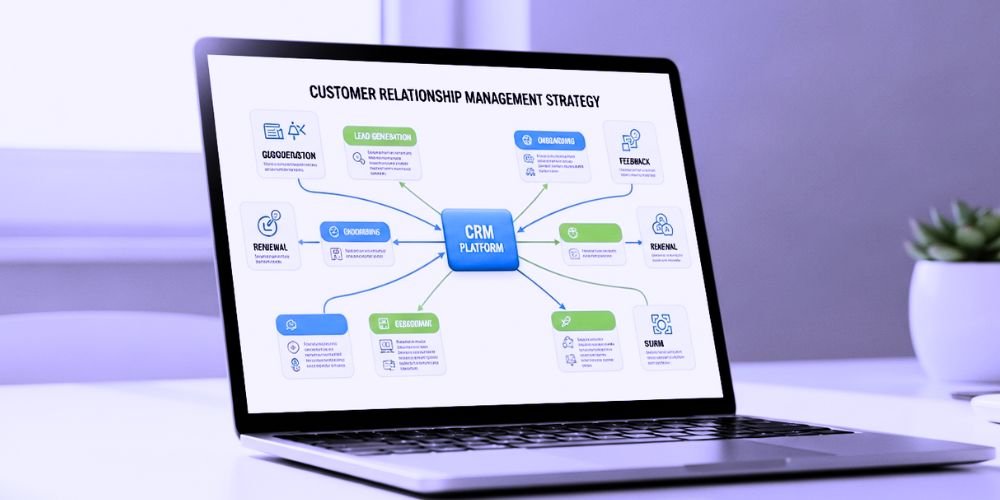CRM Strategy, short for Customer Relationship Management Strategy, is a comprehensive approach focusing on nurturing and strengthening customer relationships to drive business success. In today’s competitive market, delivering exceptional customer experiences and building lasting connections have become essential for sustained growth and profitability. In this article, we will explore the significance of a CRM strategy, its key components, and its impact on building strong customer relationships to propel the business forward.
Understanding CRM Strategy
A CRM strategy is a structured plan that puts customers at the forefront of business operations. It involves adopting technology and data-driven approaches to manage customer interactions, sales, marketing, and customer service. The primary objective is understanding customers better, anticipating their needs, and delivering personalized experiences that exceed expectations. A well-crafted CRM strategy leverages technology, data, and customer insights to ensure personalized interactions, foster customer loyalty, and maximize customer lifetime value.
Critical Components of CRM Strategy
When it comes to developing a successful CRM strategy, several critical components must be considered. One of the most important is thoroughly understanding your target customers and their needs.
Customer Data Centralization
A fundamental component of CRM strategy is centralizing customer data from various touchpoints, such as sales, marketing, and customer service. Organizations can gain valuable insights to tailor their offerings and communication by having a unified view of customer interactions. This centralized data enables businesses to create a 360-degree customer profile, allowing them to understand each customer’s preferences, purchase history, and engagement patterns.
Segmentation and Personalization
CRM strategy involves segmenting customers based on their characteristics, behavior, and preferences. With this segmentation, businesses can personalize interactions, offers, and marketing messages, creating more relevant and engaging experiences for each customer segment. Personalization enhances customer satisfaction and connects the customer and the brand.
Sales Process Automation
CRM systems often incorporate sales automation tools that streamline the sales process, from lead generation and prospecting to deal closure and post-sales follow-ups. Automation saves time, improves efficiency, and allows sales teams to focus on building relationships. Automated workflows ensure that leads are nurtured, opportunities are noticed, and customers receive timely follow-ups and support.
Customer Service Excellence
Providing exceptional customer service is a crucial element of CRM strategy. By promptly addressing customer inquiries and issues, businesses can foster trust, loyalty, and positive word-of-mouth, enhancing the overall customer experience. CRM systems often include ticketing systems and case management tools that enable customer service representatives to efficiently handle customer queries and ensure a seamless resolution of problems.
Customer Journey Mapping
Understanding the customer journey is vital in a CRM strategy. Mapping the various touchpoints and interactions across different stages of the customer lifecycle helps identify pain points and opportunities for improvement. Businesses can optimize touchpoints by analyzing the customer journey to ensure a consistent and satisfying experience at every stage of the customer’s relationship with the brand.
Data Analysis and Insights
A data-driven approach is at the heart of CRM strategy. Analyzing customer data and behavior helps identify trends, preferences, and areas for improvement, enabling businesses to make informed decisions. With the help of analytics tools integrated into CRM systems, companies can measure customer engagement, track the effectiveness of marketing campaigns, and identify areas where customer interactions can be further improved.
The Impact of CRM Strategy on Building Strong Customer Relationships
A robust CRM strategy is essential for building lasting customer relationships. By understanding their needs and providing tailored experiences, you can create a loyal customer base that will drive revenue growth and contribute to the long-term success of your business.
Customer Retention and Loyalty
CRM strategy focuses on nurturing existing customer relationships, leading to increased customer retention and loyalty. Satisfied and loyal customers are likelier to become brand advocates, recommending the business to others and contributing to long-term success. CRM systems enable enterprises to identify at-risk customers and take proactive measures to retain them.
Enhanced Customer Experience
A personalized and attentive approach, facilitated by CRM strategy, enhances the overall customer experience. Understanding customer needs and preferences allows businesses to deliver relevant solutions, delighting customers at every touchpoint. The ability to provide personalized recommendations, tailored promotions, and responsive customer service builds a positive brand perception.
Increased Sales and Revenue
CRM strategy helps identify cross-selling and upselling opportunities, enabling businesses to maximize customer lifetime value. Companies can boost repeat sales and revenue growth by nurturing customer relationships and providing exceptional experiences. CRM systems track customer interactions and purchase history, enabling businesses to make targeted product recommendations and drive additional sales.
Improved Customer Service
Efficient customer service, supported by CRM systems, leads to faster issue resolution and higher customer satisfaction. Positive customer interactions contribute to a positive brand image and strengthen customer relationships. CRM systems store customer support history, giving customer service representatives a comprehensive view of each customer’s journey and ensuring personalized and efficient support.
Strategic Decision-Making
CRM strategy provides valuable data and insights that inform strategic decision-making. By understanding customer behavior and preferences, businesses can effectively align their offerings and marketing efforts to meet customer needs. Data analytics from CRM systems help companies to identify emerging trends, predict customer needs, and optimize marketing strategies.
Conclusion
A well-defined CRM strategy is indispensable for businesses seeking to build lasting customer relationships and achieve sustainable success. By centralizing customer data, personalizing interactions, and focusing on customer experience, CRM strategy fosters customer loyalty, drives sales growth, and enhances brand reputation. As customer expectations evolve, businesses prioritizing CRM strategy and nurturing customer relationships will thrive in a competitive market and secure their position as customer-centric industry leaders.
Embracing a CRM strategy is a wise investment in enhancing HR operations and a step towards creating a workplace that values employees and nurtures their growth and well-being. A customer-centric approach focused on building solid relationships is the foundation for long-term business success, as customers drive growth, profitability, and brand advocacy.













